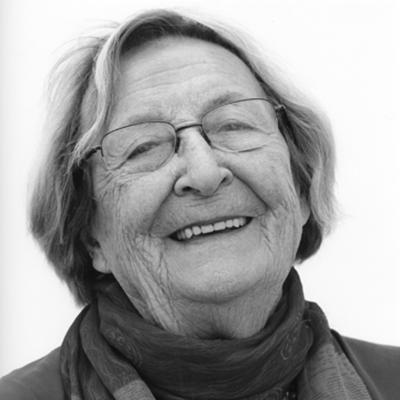Who I Am And Why I Write ...
Montserrat Abelló
Abelló's poetry, which has been collected into one volume entitled At the Heart of the Words. Collected poems 1963-2002, for which she received the 2003 Lletra d'Or Prize, is notable for a voice that is at once firm and intimate, and for its overall consistency and unity of direction. Although, when Abelló began to write, she was influenced by the socially committed poetry, her situation as a woman and mother after the birth of a mentally handicapped child pushed her into responding to her urge to write. Over the years, her poetic expression would become sparer and increasingly refined. Themes like love, loneliness, the passing of time and poetic creation acquire in her poetry an incisive and personal touch, recalling the best of the twentieth-century English-language women writers.
I am a woman who has lived many years and through crucial periods of history: the proclamation of the Spanish Republic, Franco's military uprising, the Civil War and exile, which I shared with my father, a naval engineer, first in France, then in England and finally in Chile. It was there that I met my husband, who was also in exile, and there that our daughter and two sons - the younger boy with Down's Syndrome - were born.
Although I was born in Tarragona - like my three sisters and brother - and it is a city I love and consider mine, I have spent very little time living there, only when I was very young when we used to go with my parents in the summer holidays and at Christmas to visit my grandparents. I have spent almost half my life outside of Catalonia but can say that I am Catalan through and through and that all of us in the family have always spoken Catalan.
I am rather a timid person, but also passionate and have lived each stage of my life intensely, and its vicissitudes have brought me moments and experiences that have been painful at times but always enriching. Why do I write? I would say fundamentally because of my love of words. I have always been fascinated by their sound. My mother told me that when I was a little girl I used to play at reciting poems that I invented myself, just repeating the new words I was learning. Again, when I was fed up with studying, I used to look for poems and then learn them by heart. Another factor that has certainly influenced me in my love for the rhythm of words is my knowledge of English, which is a very musical language that, phonetically speaking, has many sounds that are similar to Catalan. As a result of the time we spent in London it has been my second language since I was six years old. Even when I was small I knew the nursery rhymes and later, of course, a lot of poetry: Shakespeare, Keats, Shelley, and Rossetti. Reading was my passion.
Nonetheless, the tumult of adolescence and the host of things that were happening at the time meant that I didn't really think about writing until we had settled down in Chile and I made contact with exiled friends and writers such as Joan Oliver, Domènec Guansé, Xavier Benguerel, and with other writers from Chile, for example González Vera and Pablo Neruda. It was then that I started attending a literary workshop with Rafaela de Buen, who was also a writer, and I wrote some stories in Spanish. Not long afterwards, our third child was born. The shock of the diagnosis, at a time when the knowledge and facilities that are fortunately available today didn't exist, aroused in me the imperative need to express everything I had long been carrying around inside me as a woman. And I turned to poetry, but not trying to follow the established canons as I had sporadically been doing until then - something that never really satisfied me - but taking my lead from my inner impulses, basing my writing on the rhythm of the words. And in Catalan! Since then I've never stopped writing poetry and I know that this is my form of expression. I believe that I was greatly helped in this by the admiration I felt for my friend the painter Roser Bru. I mean that when some event, an image, or feeling catches you unawares and you capture it in a painting or a poem, it is fixed there by the vital need to express it, but it's also open so that others can look at it and read it and make it theirs.
On my return to Catalonia I published Vida diària (Everyday Life) thanks to the enthusiasm of my good friend, the poet Joan Oliver (Pere Quart). Since then, I've always written and translated, another of my passions. I could add a lot more: first, even if I didn't publish, I'd still keep writing and keep doing it in my own way, without concessions. But managing to get published is an important goal. And this would not have been possible without the support of my family, my male and female friends and, in particular, the women I've met through feminism, the poets, both men and women, whom I love, and the actresses who have participated in readings of my poems and translations. By way of conclusion, I might say, as I say in one of my poems, that I write because I love life and in this way I very often make it mine.
Copyright © 1998 Institució de les Lletres Catalanes (Institute of Catalan Letters), with the author's permission




